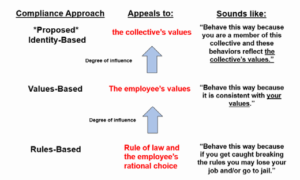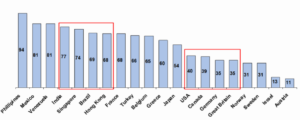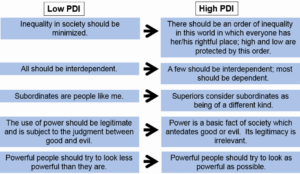» Multinational companies (MNCs) must take a different approach to compliance when they are operating outside of their headquarters country.
» MNCs under‑resource and under‑emphasize both domestic and foreign compliance functions for a variety of reasons.
» U.S. laws prohibiting foreign corrupt practices place western MNCs at particular compliance risk.
» The approaches currently used to prevent foreign corruption are of dubious value.
» A new, more culturally engaged approach to foreign corruption prevention is required.
A new, identity-based approach to foreign compliance
Last month we reviewed some of the reasons why the corporate function of Compliance is challenging in countries that have different cultures and well-known problems with corruption. The key to anticorruption compliance in any country or culture is behavior modification. Compliance professionals seek to influence the thinking and behavior of company employees, bending them McCampbell away from thinking and courses of action that could result in liability for the company. But how you go about influencing an individualist (largely Western countries) and collectivist (the East and much of Latin America and Africa) is very different.
Collectivists are influenced—some say defined or even formed—by relationships among their in-group, their collective. Contrast this idea of collective norm-setting with individualistic cultures, where “interpersonal relations are less important, [so] the ethical compliance is sought through formal structures, and regulations are often respected.” Individualists, like the label action that could result in liability for the company. But how you go about influencing an individualist (largely Western countries) and collectivist (the East and much of Latin America and Africa) is very different.
Collectivists are influenced—some say defined or even formed—by relationships among their in-group, their collective. Contrast this idea of collective norm-setting with individualistic cultures, where “interpersonal relations are less important, [so] the ethical compliance is sought through formal structures, and regulations are often respected.” Individualists, like the label implies, are less influenced by groups and other individuals, preferring to define themselves and model their behavior according to their own desires and judgment. No doubt, this statement sounds comfortable and familiar to any American compliance professional.
So both of the current western approaches to compliance—the rational and values-based approaches—focus the attention of behavior modification on the individual choices and values of the individual employee. The rules based approach appeals to the individualist’s instinctual respect for formal structures and the rule of law. The values-based approach appeals to the individualist’s desire to make their own value choices (see table 1). These methods work, but mostly in places dominated by individualists—where corruption isn’t
 a major problem. Could it be possible that a new approach is needed for modifying the behavior of collectivists?
a major problem. Could it be possible that a new approach is needed for modifying the behavior of collectivists?
Because the collectivist’s identity is formed in and through the relationships of the collective, the most impactful method for influencing that employee is through the collective. The values you want the collectivist employee to internalize aren’t some abstract legal concepts. You aren’t asking them to form their own individual attitudes and values toward corruption. You are presenting them the opportunity to internalize the values of the collective. Thus, your collectivist compliance effort is entirely built around the following process:
- Clear and unambiguous expressions of the collective’s )the employee’s in-group) views on corruption;
- In messages stated by a leader of the employee’s collective (not some imported lawyer); and, crucially,
- Continuous, visible, reinforcing behavior by the company’s senior leaders in conformance with the stated values.
The first two points are relatively simple and easy to achieve. The last point is the toughest one in a collectivist culture, because collectivists tend to also be high in the second of Hofstede’s dimensions: power/distance.
The power/distance dimension
Getting a collectivist employee to “drink the anti-corruption Kool-Aid” and internalize corporate anti-corruption doctrine is potentially easier in a collectivist culture than an individualist culture. You see, while an individualist is resistant to external influences, a collectivist is dependent upon, and deeply influenced by, an external entity: their in-group. An anti- corruption initiative communicating the values of that group across the employee’s “family” yields transformative results that would surprise stubbornly independent Western individualists. But there is another important dimension. Societies divide rather clearly along a line measuring a culture’s relative comfort or discomfort with inequality and the relative distance between powerful people and the employees over whom they have authority. Many of the countries that were identified as collectivist in the prior article are seen as high power/distance cultures, including the highly collectivist cultures of Hong Kong, Singapore, and the Philippines.
Table 2: Power/Distance Index (PDI) Values by Country

Employees in high power/distance countries expect inequality, rigid corporate hierarchies, and different rules for the
rulers and the ruled. There is an interesting correlation between Hofstede’s Power Distance Index and the Individualism Index. Individualist cultures value individual initiative and achievement. But to an individualist, inequality—the inevitable consequence of a culture that values and rewards individual achievement—should be minimized, especially when it comes to factors out of the control of the individual (e.g., ascribed status, race, social class).
Countries that are predominantly collectivist tend to have high power/distance indexes, whereas countries that
scored high on the individualism index all have low power/distance indexes. When one examines the main characteristics of the power/distance dimension, it is easy to see why.
Both collectivist and high power/distance cultures tend to produce companies with stratified and hierarchical authority structures. Employees are comforted by knowing their place in the hierarchy, who their boss is, and thus who they need to please by their job performance. The West’s fondness for fuzzy or matrixed corporate management structures are not shared in the collectivist East.
The eyes of the employee are turned upward toward the people in authority. Potentially troublesome for the compliance effort, people in high power/distance cultures tend to see the boss as someone different from them, made of a different clay. So if the boss keeps a mistress in a suburban villa, drinks too much, cooks the books, or engages in corrupt acts with government officials, the employees aren’t disappointed in the way they might be in a Western, individualist culture. After all, in many countries, those are the sorts of things that bosses do.
This cultural fact is the hedgerow over which an identity-based compliance program could stumble. Everyone is watching the big boss and taking their behavioral cues. When I was living in Beijing and commuting home to the U.S. every few weeks, I would often return to China late on a Sunday night. Jet-lagged, I would be wide awake very early on Monday morning. With nothing else to do, I’d go into the office. On one of those mornings, a member of my technology staff was pulling an all-nighter to address a server issue. He saw me arriving early and told other Chinese
workers. Soon my more ambitious employees were arriving bleary-eyed at the office at 5:00 am—believing they were modeling the behavior that their leader would admire and reward. I had to send out a staff memo to explain the reason for my early arrivals to allow my people to sleep.
Here is the point. In collectivist cultures (which is generally where corruption risk is highest), companies actually have an influencing opportunity that is not available to them in individualist cultures: to directly and deeply shape employee values, behavior— even their identities. But the flip side of that opportunity is that most collectivist cultures are also high power/distance cultures. If the head of the collective (the family) does not exhibit the compliance behavior that the company is trying to model for local employees, then all the training, the policies,
and the brave statements of company values will be useless. The compliance effort will fail.
The notion of shared values and company loyalty may nowadays seem quaint in Western, individualist societies, where an employee’s strong sense of personal identity with the company has, sadly, gone the way of blue suits and red ties at IBM. Now, a big company’s relationship with its employees is largely episodic, transactional and, though
it may span years, lacks a sense of mutual commitment and permanence. And this is why American companies have had no choice but to adopt values-based compliance programs in the U.S. These employees are, quite justifiably, deeply cynical about corporate codes of ethics.
Table 3: Contrasts between low and high power/distance concepts

The only option for the U.S. Compliance professional is to position correct behavior either in terms of the law or in terms of the employee’s own values.
Contrast this with the Eastern collectivist, who embraces (so much more than the Westerner) the norm-creating, order- producing, mutually supporting principle of the family—the employee’s in-group. In Beijing we ran the company like a family. What is the most fundamental characteristic of family? It is permanent membership. Though employees rarely left us, sometimes they went elsewhere for better opportunities. These people were always welcomed back, like members of our family, to our mid-autumn and spring festival celebrations. This had a profound impact on employees. It inspired deep commitment and in-group loyalty that Western business leaders can only dream about.
Your company’s foreign compliance program
The minds of corporate compliance and human resource professionals are hardwired to promulgate globally consistent codes of ethics and compliance policies. Although there is a strong case for globally consistent procedures that a company uses to implement its compliance programs, the policies themselves must be adapted to foreign legal
and regulatory requirements and arise from local culture.
“Oddly, companies generally perform less, not more, monitoring of their overseas operations than at home”
Distance and language both diminish and complicate foreign compliance initiatives. Studies have found a huge disconnect between anti-corruption plans that are conceived in the U.S. and the actual implementation of those
plans in foreign venues where bribery is most likely to occur. Oddly, companies generally perform less, not more, monitoring of their overseas operations than at home. Although almost every large American corporation has a code of ethics and even a global compliance plan, a recent survey found that a mere 52% of them have multilingual versions of these resources available. Only 19% of these companies rated their codes of ethics and compliance plans as ‘‘extremely effective.”
The global corporate compliance group, McCampbell Global, LLC, has designed an anti-corruption and corporate compliance approach specifically for the high-risk, collectivist employee in the Western company’s overseas offices. It has several unique features that have been proven effective at encouraging compliance and combatting corrupt
behavior outside the U.S. Here are a few of the highlights:
- All corporate compliance policies are written and “owned” by the local business and stated exclusively in the local language. This process is best conducted collectively by the company’s local employees. Global corporate policies promulgated by HR and compliance professionals in the company’s headquarters are not ignored, but they are seen as supplemental to the local policies.
- All anti-corruption and compliance training is conducted by people who employees would consider to be members of their “in-group,” whether it’s the local country manager or the local head of HR. Foreign lawyers, HR, and compliance professionals are not present during the local employee training.
- Local country managers and other senior leaders are given separate anti-corruption and compliance training that stresses the importance of modeling correct behavior to employees. Senior managers who cannot embrace the importance of compliance are replaced.
- Anti-corruption cadres are appointed from employees in each functional area (e.g., sales/marketing, technology,manufacturing) to monitor compliance risks, to periodically report compliance challenges encountered, and to take active measures to prevent failures of compliance.
Conclusion
Because the key to anti-corruption compliance in any country or culture is behavior modification, compliance
professionals should use all the cultural tools at their disposal to influence the thinking and behavior of employees in faraway places. Companies adopting the above anti-corruption and compliance approach have been shown to substantially decrease incidents of non-compliance with legal standards and company policies.
